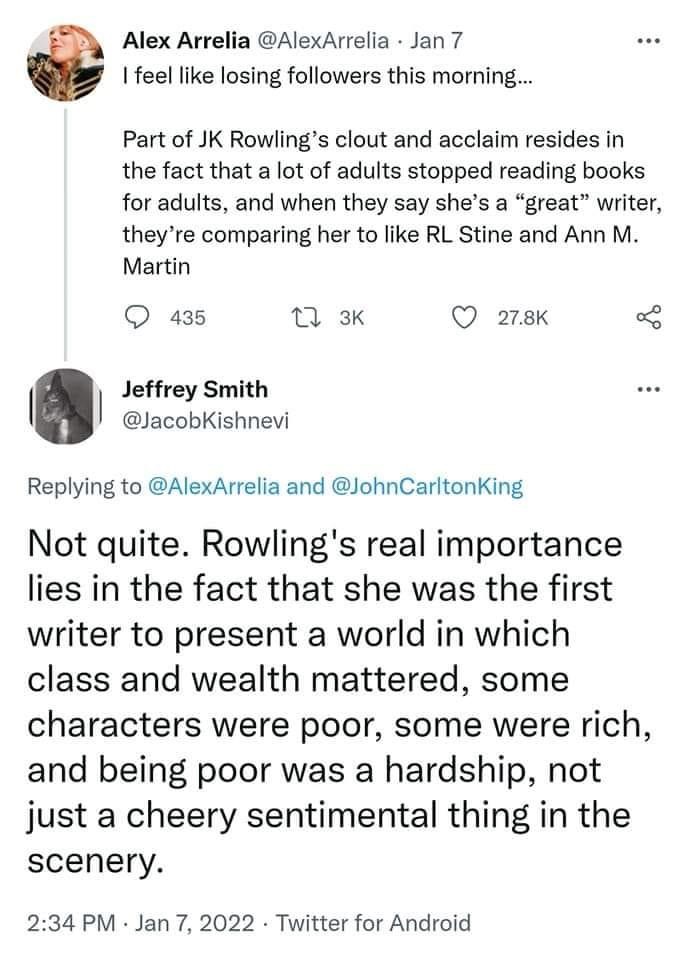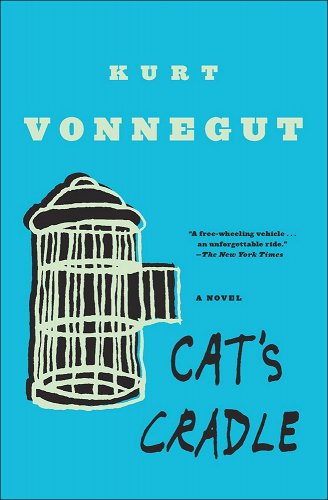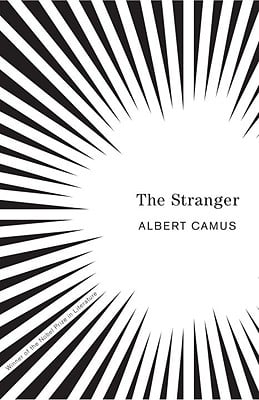4 Overrated Authors and 4 You Should Read Instead
Recently it came to my attention that for a lot of people my age and younger, their literary knowledge basically begins and ends with Harry Potter.
Now, there’s nothing wrong with being a fan of Harry Potter. I grew up with the books myself; the 5th, 6th, and 7th books came out as I turned 15, 16, and 17 respectively. I would get them within the first week of hitting stores, and would read them within a day. Leading up to the release of each new novel I would read the previous books so they would be fresh in my mind. But there are so many great authors out there, and I feel like there are some we’ve given enough time. Granted my expertise is more in film and television, but I’ve been known to read a book or two. So, I wrote this list of authors we’ve paid enough attention to and some I think deserve some time in the spotlight.
Overrated: J.K. Rowling
Rowling has come under heat for her recent, blatantly transphobic remarks. This isn’t about that honestly, as her transphobia never effected the Harry Potter series. This is about that Harry Potter, which was written for lonely nerds ages 11-17, and should be mostly read by lonely nerds ages 11-17. The plot holes in the series have been talked about over and over again. That’s not to say fans can’t revisit their favorite work, but c’mon now. It’s been 20 years of non-stop Harry Potter. It’s supposed to be a gateway drug, but unlike gateway drugs it rarely seemed to pull in people to the harder stuff.
You Could Try: S.E. Hinton
S.E. Hinton wrote The Outsiders when she was only 15 years old, which is why I feel like it’s odd I haven’t seen her work connecting much with youth in this age of empowerment. And it’s not just that she wrote a novel at that age, it’s that it’s also so damn good. As a teenager Hinton had an understanding of human condition that many authors never achieve. Her empathetic take on the struggles of poverty likens that to Russian authors like Tolstoy or Dostoevsky.
Good One to Start With: Rumble Fish
Rumble Fish was always my personal favorite. Like all her books it’s about a poor teen in a midwestern town. The protagonist is aimless, living conditions are bleak, and none of the adults seem to have it figured out. I feel like this novel would resonate with a lot of teens right now.
Overrated H.P. Love Craft
H.P. Lovecraft introduced new anxieties and fears into the hearts and minds of million across the globe. While his writing didn’t become popular until after his death, in the last couple decades, it has become seminal on the reading lists of horror and sci-fi fans alike. His work often centers around the void, or the fear of terrible, incomprehensible things. Often they enter and torment people with intrusive thoughts and images, which probably mirror his own anxieties throughout his reclusive life. The problem is the extreme racism, which does effect his writing.
You Could Try: Nikolai Gogol
Nikolai Gogol was a writer in Russia in the early and mid 1800s. His work tends to be more surrealist than horror, but the themes and anxieties are similar. He wrote many short stories, novellas, and one novel Dead Souls. While never gaining popularity in his lifetime, his writings have been direct influences on acclaimed writers like Dostoevsky, Kafka, and Steinbeck. His stories combine fantasy, existentialism, surrealism, and criticisms on wealth disparity and bureaucracy. One thing I love about many 19th century Russian authors is their empathy for the lower classes. Gogol is no exception. One of the best examples of this is the short story “The Overcoat”. It tells the story of a poor man who is robbed of a recently purchased overcoat, and then asks for help from an upper-middle class person. The person denies to help, and the old man freezes to death in the Siberian winter.
Good One to Start With: Diary of a Madman and Other Stories
Diary of a Madman is a 25 page short story that chronicles one man as he slowly loses his mind. He is a middle class worker that becomes fixated on the correspondence of the dogs of two upper-class women. The collection also includes The Nose (where a man loses his nose), The Overcoat, and the Portrait.
Overrated: David Foster Wallace
The bandana-clad Gen X bad boy author of the 90’s, David Foster Wallace gained popularity with his magnum opus Infinite Jest. As the child of two academics, Wallace devotes a large portion of his writing to how much more intelligent he is than you. His writing captured the mood of an entire generation, if that entire generation was an upper-middle class suburban white male. Infinite Jest lives up to its title as a 1,000 plus page meandering tale of sardonic responses and being mad at your parents.
You Could Try: Kurt Vonnegut
This may seem like trading in one Hipster Card for another, but hear me out. Vonnegut’s writing moves past satire. What many would consider his best work, Slaughterhouse Five is the perfect example of how complex existentialisms and pontifications can be done quickly and efficiently. Vonnegut rarely would write a run-on sentence, but in a few words could say a phrase you’ll ponder the rest of your life like “If the accident will”. He mostly considered himself to be a sci-fi writer, and sci-fi elements do enter into most of his stories, but what really shines is the contrast between his droll wit and the often profound existential themes behind his writing. His books usually move at an even pace, giving you just enough to want to keep going.
Good One to Start With: Cat’s Cradle
I debated whether Cat’s Cradle or Slaughterhouse Five would win out. And honestly, you could probably read both in the same day. Cat’s Cradle is about a newspaper journalist, three children of a dead scientist, and a fictional island nation that has been facing nothing but hardships since colonization. This one is more of a traditional novel than Slaughterhouse, which is why it won out. The twist reveal in the middle of the book made me laugh harder than the other book, but its ending is one of the more satisfying takes on “Well the human race is doomed I guess”.
Overrated: Fredrich Nietzsche
I will admit, Nietzsche makes some good arguments. As industrialization and capitalism hit Europe, he asserted that it would soon take over our lives, to the point that we would feel guilt if we even took the time for general self reflection. He also came up with the time is a flat circle theory (Doctrine of Eternal Recurrence), which cosmologists are starting to think is possible. Pretty spot on. But at the same time I’m not a fan of some of his takes like that his is the most genius of all genius, or that altruism doesn’t exist. His take on the Uber Mensch, or the man on the mountain, influenced Hitler’s take on creating the “Aryan” race origins.
You Could Try: Albert Camus
If you don’t know much about Albert Camus, the dude was dope. Quick bullet point of his life.
- Born and Raised in Algeria in 1913
- Protested Segregation and Apartheid in Africa in the 30’s
- Fought against the Nazi’s in the French Resistance
- Got famous partially for being handsome and cool
- Is responsible for “One must imagine Sisyphus happy”
- Wrote plays and novels that question the very meaning behind morality
- Won the Nobel Prize in Literature, and turned it down
- Died in a car crash in a convertible with a famous french actress at 44
Camus, along with Jean-Paul Sartre, are largely responsible for creating the philosophical arguments behind absurdism. Absurdism boils down to embracing the cold indifference of the universe by choosing a life of substance.
Good One to Start With: The Stranger
The Stranger follows Meursault, who feels no empathy. He murders a man with a gun on a beach, then it goes through the trial and execution. This novella touches on absurdism, our relations to one another, and how we define morality. It’s also the subject of an awesome song by The Cure.
Honorable Mentions for Author’s/Books to Read
W.E.B. Dubois
Viktor Frankel
A Hundred Years of Solitude – Gabriel Garcia Marquez
Jean-Paul Sartre
Code Talker – Joseph Bruhac
Ralph Ellison
Zadie Smith – Swing Time
Notable Native People – Adrienne Keene
American Indian Stories – Zitkala














